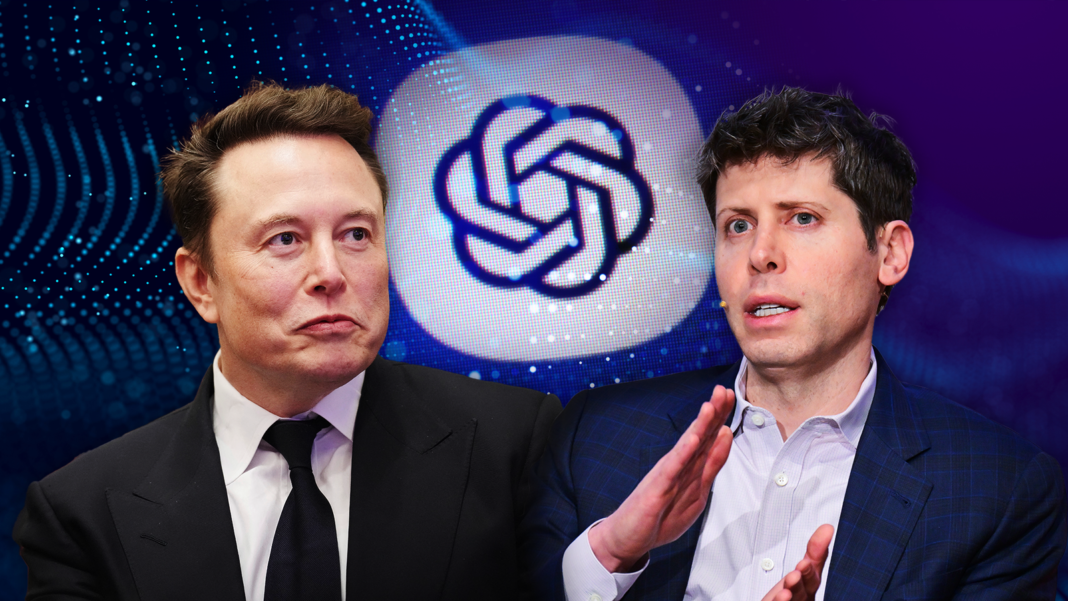Elon Musk’s bid to buy OpenAI for $97.4bn (£78.7bn) came unsolicited on Monday night and was quickly rejected by his former friend and OpenAI chief executive Sam Altman.
“The company is not for sale, neither is the mission,” Mr Altman said to Sky News this morning.
“We’ll happily buy Twitter though.”
Read more: OpenAI co-founder tells Sky News it’s ‘not for sale’
It’s the latest in a long-running spat between the former tech buddies.
Back in 2015, Mr Musk and Mr Altman founded OpenAI along with nine other Silicon Valley entrepreneurs to ensure “artificial general intelligence benefits all of humanity”.
But the idealistic partnership wasn’t to last. Three years later, Mr Musk left after a power struggle.
“Elon wanted us to merge with Tesla or he wanted full control,” the company wrote in a blog post about the split in 2024.
Please use Chrome browser for a more accessible video player

1:15
OpenAI Ceo Sam Altman says the company is ‘not for sale’
When Mr Altman and the others refused to hand over control, Mr Musk left acrimoniously, taking a promised $1bn donation with him, according to OpenAI.
However, he had been right about one thing. When he’d offered to let OpenAI treat Tesla as a “cash cow”, he’d said it was the only way to compete with Google’s DeepMind project, which was developing quickly.
OpenAI wasn’t bringing in enough cash and everyone agreed the company would need more resources if it wanted to reach the AI holy grail: artificial general intelligence (AGI).
AGI is a hypothetical AI system that can perform any intellectual task that a human can.
So, after rejecting Mr Musk’s offer, Mr Altman set up a “capped-profit” subsidiary of the company and got investments from Microsoft and others.
Elon Musk was not happy. He founded his own company, xAI, and then took OpenAI to court, suing for a breach of contract.
He accused the ChatGPT developer of transforming into “a closed-source de facto subsidiary of the largest technology company, Microsoft”, according to a court filing.
“It is not just developing but is actually refining an AGI [artificial general intelligence] to maximise profits for Microsoft, rather than for the benefit of humanity”, the filing said.
OpenAI denied this and also said it never promised to open-source its technology, just to spread the benefits of it.

Sam Altman listens to Ilya Sutskever during a talk in 2023. File pic: Reuters
“The Open in openAI means that everyone should benefit from the fruits of AI after it’s built, but it’s totally OK to not share the science…”, wrote former OpenAI chief scientist Ilya Sutskever in an email to Elon Musk in 2016.
“Yup,” he replied, according to OpenAI.
But the subsidiary still wasn’t bringing in enough money and rumours began swirling in 2024 that Mr Altman would turn OpenAI into a for-profit company.
Despite Mr Musk asking a judge to block this from happening, in December, Mr Altman officially released his plans for OpenAI’s for-profit arm to take control and “raise the necessary capital” to reach general artificial intelligence.
The non-profit side of the company would still exist to work on AI for the public good, the company reassured people.
In order to make the switch from non-profit to for-profit, OpenAI’s board is currently going through a complex process to value parts of the company.
Sam Altman will then have to essentially buy the company from the non-profit, which is currently thought to be worth around $40 billion.
Please use Chrome browser for a more accessible video player

1:18
AI summit overshadowed by ‘tech bros bust up’
Musk throws a ‘wrench’ into Altman’s profit-making plans
But Elon Musk has now “thrown a wrench” into those proceedings with his $97.4bn (£78.7bn) offer, according to Yale professor Jonathan Macey, who specialises in corporate governance.
“The non-profit is supposed to take money to do whatever good deeds, and if OpenAI prefers to sell it to somebody else for less money, it’s a concern for protecting the interests of the beneficiaries of the not-for-profit.”
OpenAI “may not be able to ignore” the bid, according to analyst Gil Luria, because it has credible investors backing it, including Ari Emanuel, chief executive of entertainment company Endeavour, and multiple other investment groups.
However, others think this could just be another dig from Elon Musk to his former friend.
“It’s partially a troll, and partially setting a price that may cause Sam to pay more than he might want to,” wrote Dan Primack, Axios’s business editor, on X.
However, when Sam Altman spoke to Sky News from an AI summit in Paris on Tuesday morning, he sounded confident.
“The company is not for sale, neither is the mission.”
He was asked whether he can still afford to keep control of OpenAI after Mr Musk’s bid.
“The board will decide what to do there… the mission is really important and we’re totally focused on making sure we preserve that,” he told Sky’s science and technology editor Tom Clarke.
Read more from Sky News:
Has Elon Musk just put OpenAI in a tricky situation?
In China’s Silicon Valley, where DeepSeek founder keeps a low profile
‘Consolidating power’
If Mr Musk’s bid were to be successful, some are worried about the degree of influence it could give him.
“Musk obviously already controls [X],” Sherif Elsayed-Ali, executive director of the Future of Technology Institute, told Sky News.
“If he were to take control of OpenAI, or ChatGPT, which is the most widespread AI system out there, then you can see how that’s really starting to consolidate power,” he said.
“The reality is, Musk is a political actor as well, so this is not a pure business transaction.”







